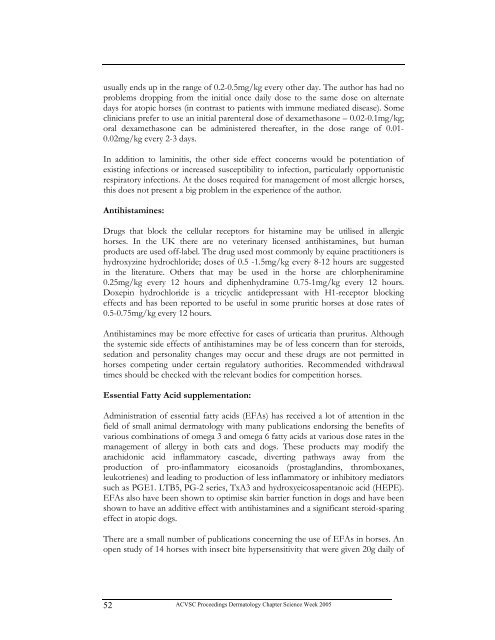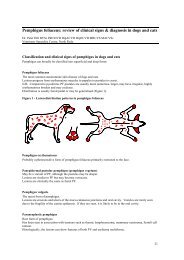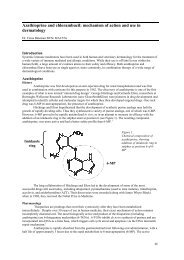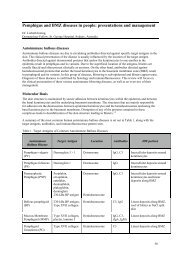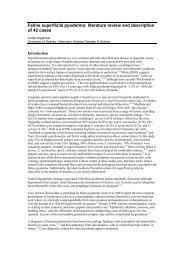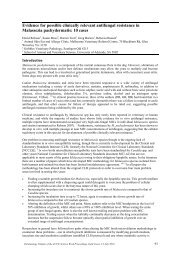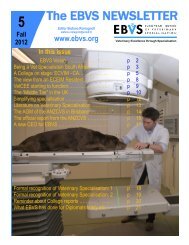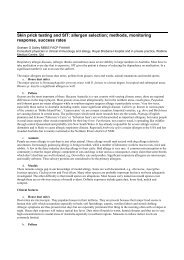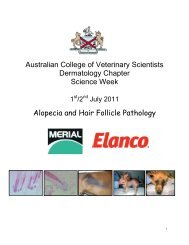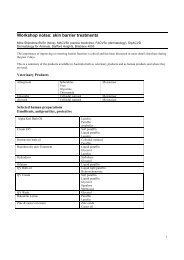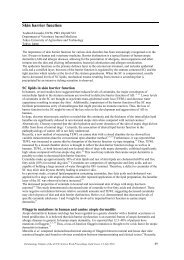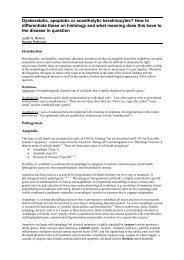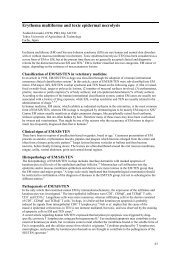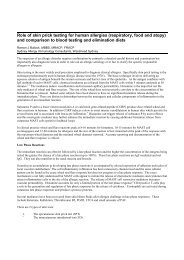here - Australian College of Veterinary Scientists
here - Australian College of Veterinary Scientists
here - Australian College of Veterinary Scientists
You also want an ePaper? Increase the reach of your titles
YUMPU automatically turns print PDFs into web optimized ePapers that Google loves.
usually ends up in the range <strong>of</strong> 0.2-0.5mg/kg every other day. The author has had no<br />
problems dropping from the initial once daily dose to the same dose on alternate<br />
days for atopic horses (in contrast to patients with immune mediated disease). Some<br />
clinicians prefer to use an initial parenteral dose <strong>of</strong> dexamethasone – 0.02-0.1mg/kg;<br />
oral dexamethasone can be administered t<strong>here</strong>after, in the dose range <strong>of</strong> 0.01-<br />
0.02mg/kg every 2-3 days.<br />
In addition to laminitis, the other side effect concerns would be potentiation <strong>of</strong><br />
existing infections or increased susceptibility to infection, particularly opportunistic<br />
respiratory infections. At the doses required for management <strong>of</strong> most allergic horses,<br />
this does not present a big problem in the experience <strong>of</strong> the author.<br />
Antihistamines:<br />
Drugs that block the cellular receptors for histamine may be utilised in allergic<br />
horses. In the UK t<strong>here</strong> are no veterinary licensed antihistamines, but human<br />
products are used <strong>of</strong>f-label. The drug used most commonly by equine practitioners is<br />
hydroxyzine hydrochloride; doses <strong>of</strong> 0.5 -1.5mg/kg every 8-12 hours are suggested<br />
in the literature. Others that may be used in the horse are chlorpheniramine<br />
0.25mg/kg every 12 hours and diphenhydramine 0.75-1mg/kg every 12 hours.<br />
Doxepin hydrochloride is a tricyclic antidepressant with H1-receptor blocking<br />
effects and has been reported to be useful in some pruritic horses at dose rates <strong>of</strong><br />
0.5-0.75mg/kg every 12 hours.<br />
Antihistamines may be more effective for cases <strong>of</strong> urticaria than pruritus. Although<br />
the systemic side effects <strong>of</strong> antihistamines may be <strong>of</strong> less concern than for steroids,<br />
sedation and personality changes may occur and these drugs are not permitted in<br />
horses competing under certain regulatory authorities. Recommended withdrawal<br />
times should be checked with the relevant bodies for competition horses.<br />
Essential Fatty Acid supplementation:<br />
Administration <strong>of</strong> essential fatty acids (EFAs) has received a lot <strong>of</strong> attention in the<br />
field <strong>of</strong> small animal dermatology with many publications endorsing the benefits <strong>of</strong><br />
various combinations <strong>of</strong> omega 3 and omega 6 fatty acids at various dose rates in the<br />
management <strong>of</strong> allergy in both cats and dogs. These products may modify the<br />
arachidonic acid inflammatory cascade, diverting pathways away from the<br />
production <strong>of</strong> pro-inflammatory eicosanoids (prostaglandins, thromboxanes,<br />
leukotrienes) and leading to production <strong>of</strong> less inflammatory or inhibitory mediators<br />
such as PGE1. LTB5, PG-2 series, TxA3 and hydroxyeicosapentanoic acid (HEPE).<br />
EFAs also have been shown to optimise skin barrier function in dogs and have been<br />
shown to have an additive effect with antihistamines and a significant steroid-sparing<br />
effect in atopic dogs.<br />
T<strong>here</strong> are a small number <strong>of</strong> publications concerning the use <strong>of</strong> EFAs in horses. An<br />
open study <strong>of</strong> 14 horses with insect bite hypersensitivity that were given 20g daily <strong>of</strong><br />
52<br />
ACVSC Proceedings Dermatology Chapter Science Week 2005


